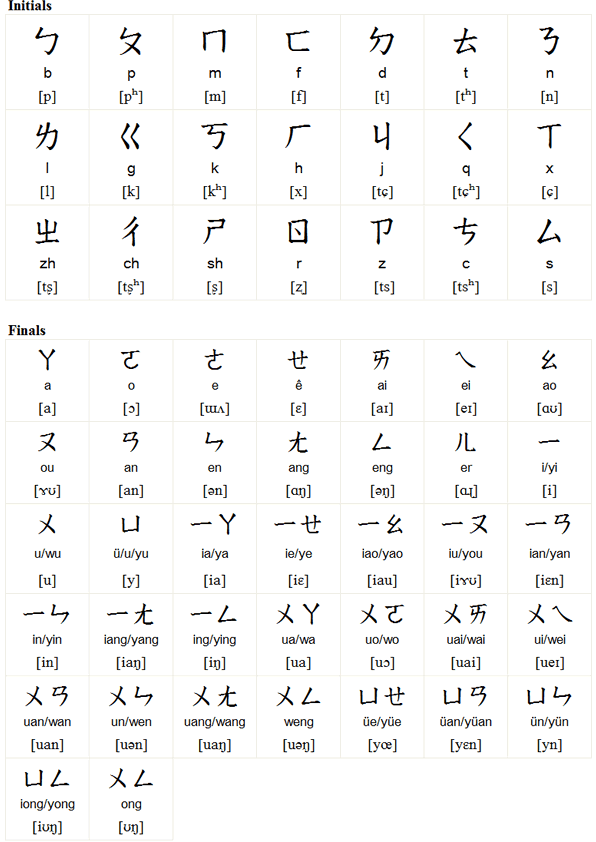Zhuyin fuhao is a phonetic script used in dictionaries, children's books, text books for people learning Chinese and in some newspapers and magazines to show the pronunciation of the characters. It is also used to show the Taiwanese pronunciation of characters and to write Taiwanese words for which no characters exist.
It was created in China between 1912 and 1913 by the Commission on the Unification of Pronunciation (讀音統一會), but was abandoned in favour of Hanyu Pinyin after 1949, and has been used in Taiwan since then.
Initially is was called 注音字母 (zhùyīn zìmǔ - "sound anotating letters") or 國音字母 (gúoyīn zìmǔ - "national phonetic letters") and it was first proposed as the national standard for transcribing Mandarin Chinese at a government-sponsored conference in 1913 and officially adopted as such in 1928. It was renamed 注音符號 (zhùyīn fúhào - "phonetic symbols") in 1930, and is popularly known as ㄅㄆㄇㄈ (bopomofo) after the names of the first 4 symbols.
The Zhuyin symbols were developed from Chinese characters and use parts of characters that have the relevant pronunciation in Mandarin. For example, ㄅ(b) comes from 勹, part of 包 (bāo). Many of the Zhuyin symbols are modelled on obsolete or cursive characters.

This order of the symbols is used in dictionaries and indices.
Download this chart in Excel, Word or PDF format
Vertical

Horizontal

Rénrén shēng ér zìyóu, zài zūnyán hé quánlì shàng yīlù píngděng. Tāmen fùyǒu lǐxìng hé liángxīn, bìng yīng yǐ xiōngdì guānxì de jīngshén hùxiāng duìdài.
All human beings are born free and equal in dignity and rights. They are endowed with
reason and conscience and should act towards one another in a spirit of brotherhood.
(Article 1 of the Universal Declaration of Human Rights)
Books about Chinese characters and calligraphy
Mandarin, Shanghainese, Hokkien, Taiwanese and
Cantonese
language learning materials
Information about Zhuyin fuhao / Bopomofo
http://en.wikipedia.org/wiki/Bopomofo
http://www.pinyin.info/romanization/bopomofo/
http://www.mandarinbook.net/bopomofo/
Bopomofo stroke order
http://commons.wikimedia.org/wiki/Commons:Stroke_Order_Project/Bopomofo
Bopomofo ㄅㄆㄇㄈ Mnemonic Worksheets for Children
http://castleofcostamesa.com/bopomofo-ㄅㄆㄇㄈ/bㄅ-bopomofo-mnemonic-activity-page
Chinese Text Annotation - adds inline Pinyin or Zhuyin annotations above words,
or adds pop-up annotations with English definition of the word to Chinese texts
http://mandarinspot.com/annotate
Chinese Romanization Converter - converts between pinyin, zhuyin and others transcriptions systems
http://humanum.arts.cuhk.edu.hk/Lexis/Lindict/
Pinyin-Zhuyin converter
http://www.inxsoft.net/mandarin-resource/converter.php
Chinese-English dictionary with pinyin and zhuyin
http://humanum.arts.cuhk.edu.hk/Lexis/Lindict/
Written Chinese: Oracle Bone Script, Simplified characters, Bopomofo, Types of characters, Structure of written Chinese, Evolution of characters, How the Chinese script works, Xiao'erjing, General Chinese
Spoken Chinese: Mandarin, Dungan, Wu, Shanghainese, Wenzhounese, Yue, Cantonese, Weitou, Min, Jian'ou, Taiwanese, Teochew, Fuzhounese, Puxian, Hakka, Xiang, Gan, How many people speak Chinese?
Other Chinese pages: Chinese numbers (數碼) | Chinese classifiers (量詞) | Electronic dictionaries | Chinese links | Books: Chinese characters and calligraphy | Cantonese | Mandarin, Shanghainese, Hokkien and Taiwanese
Akkadian Cuneiform, Ancient Egyptian (Demotic), Ancient Egyptian (Hieratic), Ancient Egyptian (Hieroglyphs), Chinese, Chữ-nôm, Cuneiform, Japanese, Jurchen, Khitan, Linear B, Luwian, Mayan, Naxi, Sawndip (Old Zhuang), Sui, Sumerian Cuneiform, Tangut (Hsihsia)
Page last modified: 15.03.23
[top]
You can support this site by Buying Me A Coffee, and if you like what you see on this page, you can use the buttons below to share it with people you know.

If you like this site and find it useful, you can support it by making a donation via PayPal or Patreon, or by contributing in other ways. Omniglot is how I make my living.
Note: all links on this site to Amazon.com, Amazon.co.uk
and Amazon.fr
are affiliate links. This means I earn a commission if you click on any of them and buy something. So by clicking on these links you can help to support this site.
[top]